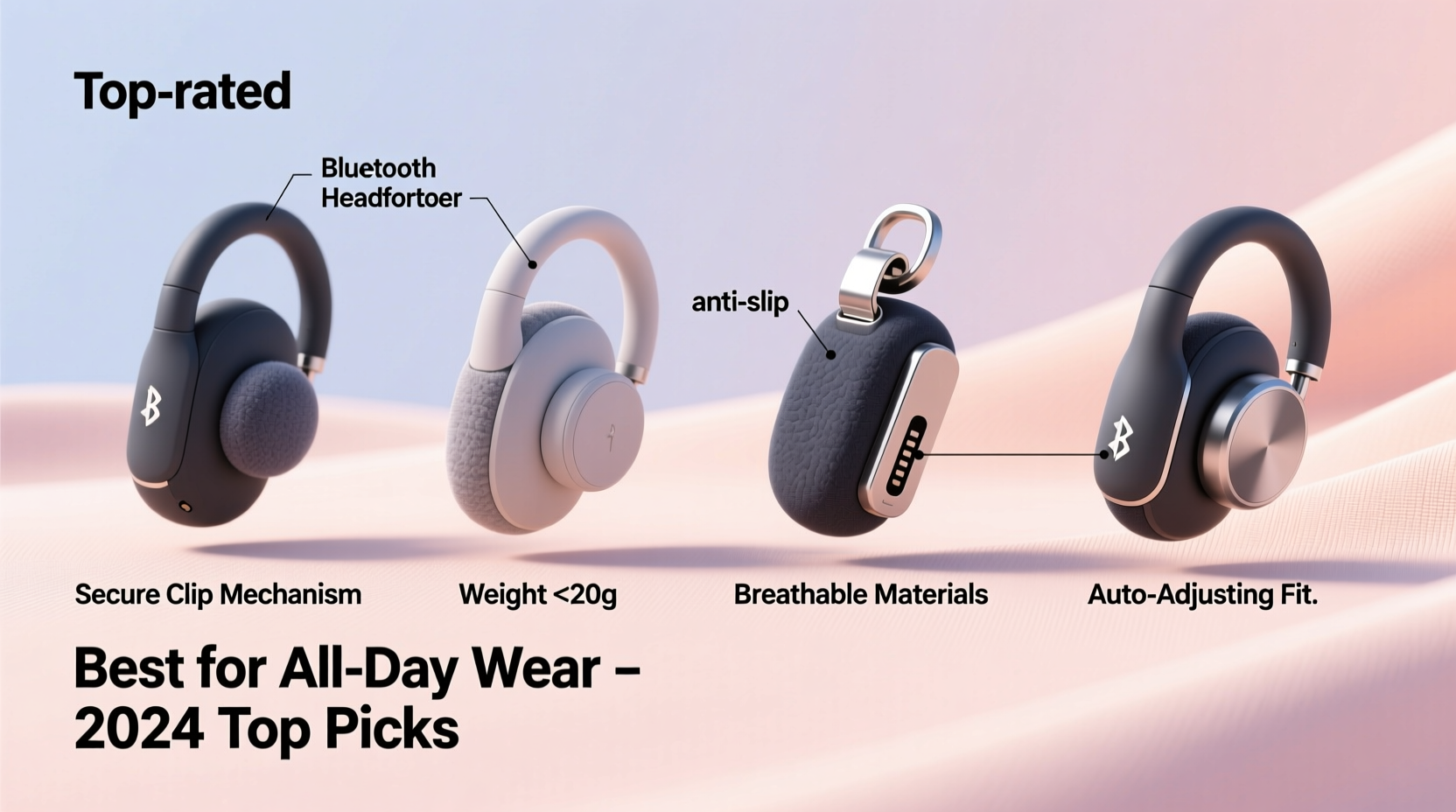In today’s fast-paced work environment—whether you're taking back-to-back calls, managing remote meetings, or commuting—wireless audio is essential. Clip-on Bluetooth headsets offer a hands-free solution that combines mobility with convenience. But not all models are built for extended use. Choosing one that remains comfortable and secure throughout the day requires careful consideration of design, fit, materials, and performance. The wrong headset can cause ear fatigue, frequent readjustments, or even discomfort after just a few hours. The right one becomes an invisible extension of your workflow.
Ergonomics: The Foundation of All-Day Comfort

The key to lasting comfort lies in ergonomics—the way the headset conforms to the natural shape of your ear and head. Unlike over-ear or in-ear models, clip-on headsets rely on a lightweight frame that attaches behind the ear, often using a flexible arm or magnetic clasp. This design minimizes pressure points but demands precision engineering.
A well-designed clip-on should distribute weight evenly across the outer ear and temple area. Look for models with adjustable tension or bendable arms that allow micro-customization. Materials matter too: silicone-coated grips, memory foam pads (if present), and hypoallergenic plastics reduce skin irritation during prolonged use.
Weight is another critical factor. Headsets exceeding 25 grams may feel cumbersome after several hours. Aim for models under 20 grams, especially if you wear glasses or have sensitive ears. Some premium designs use hollow internal structures or composite polymers to cut weight without sacrificing durability.
Secure Fit Without Compromising Comfort
A secure fit ensures the headset stays in place during movement—walking, turning your head, or gesturing during conversations. However, “secure” should never mean “tight.” Overly rigid clips can lead to soreness or headaches, particularly for users who wear them for 6+ hours daily.
Consider the ear anatomy: human ears vary widely in size and cartilage structure. A one-size-fits-all approach rarely works. Opt for headsets offering multiple ear-tip sizes or interchangeable ear hooks. Some advanced models feature adaptive hinges that automatically adjust to ear contours.
Grip texture also plays a role. Rubberized or matte finishes provide better traction than glossy plastic, especially in humid conditions or during physical activity. If you tend to sweat or live in a warm climate, look for moisture-resistant coatings.
“Long-term wearability isn’t just about soft materials—it’s about balance. A headset must stay put without fighting the body’s natural movements.” — Dr. Lena Torres, Auditory Ergonomics Researcher at MIT Media Lab
Balancing Sound Quality and Battery Life
Comfort means little if audio performance lags. For professional use, prioritize clarity in voice transmission. Background noise suppression and dual-microphone arrays help isolate your voice from ambient sounds like traffic, office chatter, or HVAC systems.
Sound delivery should be balanced—not too bass-heavy (which can cause auditory fatigue) and clear enough for nuanced speech. Bone conduction models, while less common in clip-ons, transmit sound through the cheekbones, leaving the ear canal open. This enhances situational awareness and reduces ear pressure, ideal for outdoor workers or security personnel.
Battery life directly impacts usability. Most clip-on headsets last between 4 to 8 hours on a single charge. For full-day coverage, choose models with quick-charge capabilities (e.g., 15 minutes for 2 hours of use) or portable charging cases. USB-C charging is now standard and more convenient than proprietary connectors.
| Feature | Ideal Spec | Why It Matters |
|---|---|---|
| Weight | Under 20g | Reduces ear strain over time |
| Battery Life | 6+ hours | Covers a standard workday |
| Noise Cancellation | AI-powered or dual mic | Improves call clarity |
| Charging Port | USB-C | Universal compatibility |
| Bluetooth Version | 5.0 or higher | Stable connection, lower power use |
Step-by-Step Guide to Selecting Your Ideal Clip-On Headset
- Assess Your Daily Usage: Determine how many hours per day you’ll wear the device. More than four hours? Prioritize ultra-lightweight models.
- Check Ear Compatibility: If you wear glasses, test whether the headset fits comfortably alongside the arms. Look for low-profile designs.
- Evaluate Microphone Performance: Read user reviews focusing on voice clarity. Does it pick up breathing or rustling noises?
- Test Connectivity: Ensure it supports Bluetooth 5.0+ for minimal dropouts and seamless pairing with your primary devices.
- Review Charging Options: Prefer a model with fast charging or a travel case if you’re frequently on the move.
- Try Before You Buy: If possible, visit a retailer to physically test the clamp strength and comfort.
- Verify Warranty & Support: Reputable brands offer at least a 1-year warranty and accessible customer service.
Real-World Example: A Customer Service Manager’s Experience
Sarah Kim, a customer service operations manager based in Seattle, wears a headset for nearly eight hours a day. After years of dealing with ear fatigue from traditional earbuds, she switched to a clip-on model with a titanium-reinforced hinge and open-ear design.
“The first week was an adjustment,” she says. “But once I found the right tension setting, it stayed put through every call. I no longer get that ‘plugged ear’ feeling, and I can hear my team clearly even in our noisy open office.”
She specifically values the magnetic auto-pause feature—removing the headset briefly pauses her music or call, resuming when clipped back on. This small detail reduced accidental background noise during meetings and improved her focus.
Common Pitfalls to Avoid
- Ignoring Ear Dominance: Most people have a dominant ear for listening. Wear the headset on your preferred side for better audio processing.
- Overlooking Cable Management: Even wireless headsets may have dangling cords. Choose tangle-free designs or fully wireless earpieces.
- Skipping Firmware Updates: Manufacturers often release updates to improve battery efficiency and microphone response. Check companion apps regularly.
- Using in Extreme Temperatures: Prolonged exposure to heat or cold can degrade battery life and material integrity.
Frequently Asked Questions
Can clip-on Bluetooth headsets cause hearing damage?
No more than other personal audio devices. Hearing risk comes from volume level and duration, not form factor. Keep volume below 80% of maximum and take regular breaks using the 60/60 rule: no more than 60 minutes at a time at 60% volume.
Are clip-on headsets suitable for people who wear glasses?
Yes, but carefully. Look for slim-profile models with flexible joints that don’t press against spectacle arms. Some brands design specific “with-glasses” variants featuring shorter clamps or offset housings.
How do I clean and maintain my clip-on headset?
Wipe down the exterior with a dry or slightly damp microfiber cloth daily. For deeper cleaning, use a cotton swab dipped in isopropyl alcohol (70%) on non-electronic surfaces. Avoid submerging any part. Store in a ventilated case when not in use.
Final Checklist Before Purchase
- ✅ Lightweight (under 20g)
- Ensures long-term comfort.
- ✅ Adjustable ear clip tension
- Allows customization for different ear shapes.
- ✅ Minimum 6-hour battery life
- Suitable for full workdays.
- ✅ Noise-canceling microphone
- Essential for clear voice transmission.
- ✅ Bluetooth 5.0 or later
- Provides stable, energy-efficient connectivity.
- ✅ Comfortable with glasses (if applicable)
- Prevents double pressure on the ears.
- ✅ Manufacturer warranty (1 year minimum)
- Protects your investment.
Conclusion: Make Comfort a Non-Negotiable
Your headset shouldn’t be something you endure—it should enhance your day. By prioritizing ergonomic design, secure yet gentle fit, and reliable performance, you can find a clip-on Bluetooth headset that disappears into your routine. Whether you're leading virtual teams, navigating busy commutes, or managing client calls, the right device supports your productivity without compromising well-being.









 浙公网安备
33010002000092号
浙公网安备
33010002000092号 浙B2-20120091-4
浙B2-20120091-4
Comments
No comments yet. Why don't you start the discussion?